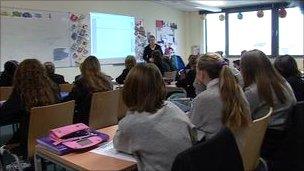Some Jersey GCSE passes lower than UK average
- Published

Jersey's state run secondary schools have very low GCSE A* to C pass rates
Jersey's state run secondary schools perform worse than almost all UK schools, according to figures released by the education department.
The island-wide pass rate including the fee-paying and selective schools compares well with the UK.
But take away their results and the GCSE pass-rates at the four State secondary schools fall dramatically.
Just 18% of students are leaving Grainville school in St Saviour with GCSE passes at A* to C.
GCSEs are taken by 16-year-olds and the Jersey government has always said the island outperforms the UK, but it has never revealed how individual schools compare.
In England 55% of children get five A* to C grade GCSE results, including English and maths.
But figures uncovered for Jersey by the Jersey Evening Post after a freedom of information request show that the four non selective states schools are well below that figure.
People in charge of education in the island have said the figures are misrepresented and that the Jersey system is totally different to the UK.
Jersey's Director of Education, Mario Lundy, said more students in Jersey go to selective and private schools.
He said: "You've got to put that into the context of the island's education system which is highly selective.
"43% of our secondary pupils are in fee paying education and a further 15% transfer to Hautlieu.
"If you simply judge their performance against academic standards then you miss the true picture."
Graham Jones worked for Ofsted in the UK, and now works for Jersey inspecting schools on a monthly basis.
He said many schools offer vocational courses for students who are not going to achieve five GCSEs.
"Having been around the majority of schools in the island the scheme employed in Jersey shows that pupils at every stage of education do very well.
"The academic pupils do extremely well and the pupils in the non-selective schools do equally well.
"If you look at the pupils who chose not transfer to the selective system, they make very good progress and achieve very good standards in the institutions they choose to remain in.
"We are very confident that each phase is very accurately monitored and what takes place is very good."
Mr Lundy said that not all schools will be able to perform at the top end in a highly selective education system.
He said: "If you look at what has happened in the UK the league tables have encouraged schools to promote a curriculum that allows the schools to do well in league tables.
"We want our schools to promote a curriculum that meets the needs of the students and obviously that depends on the context of the school."
- Published12 January 2011
- Published9 December 2010
- Published12 November 2010